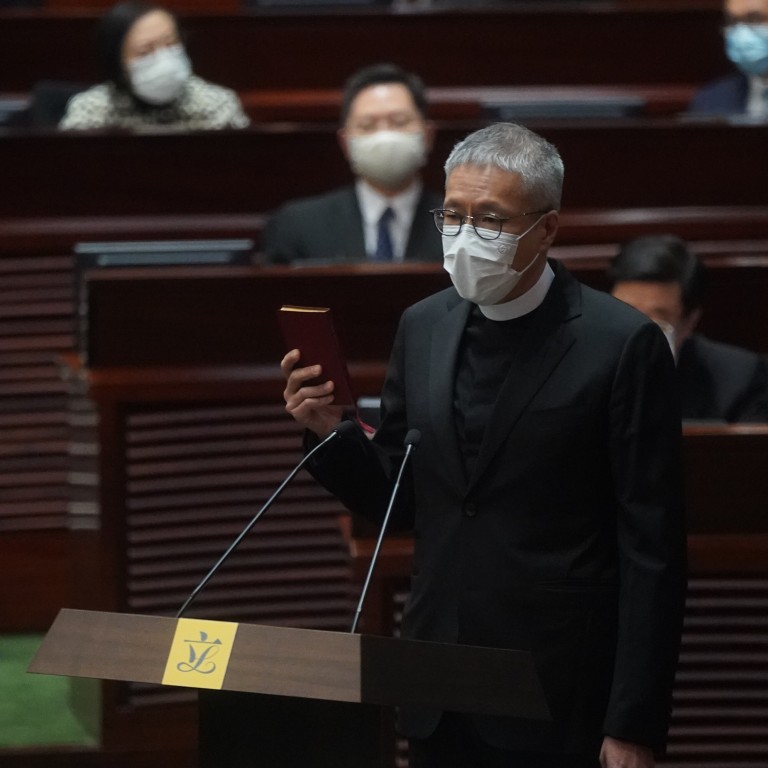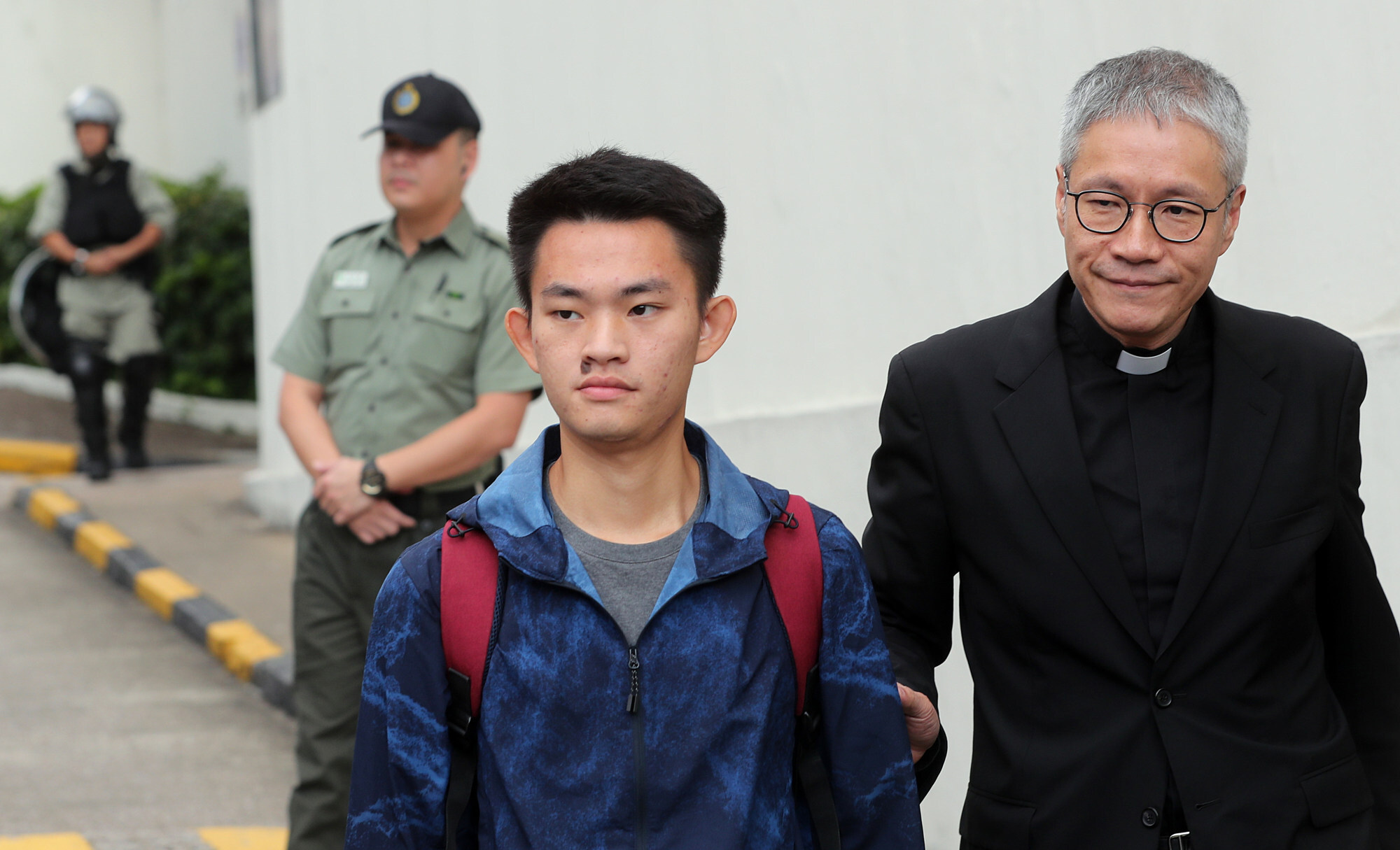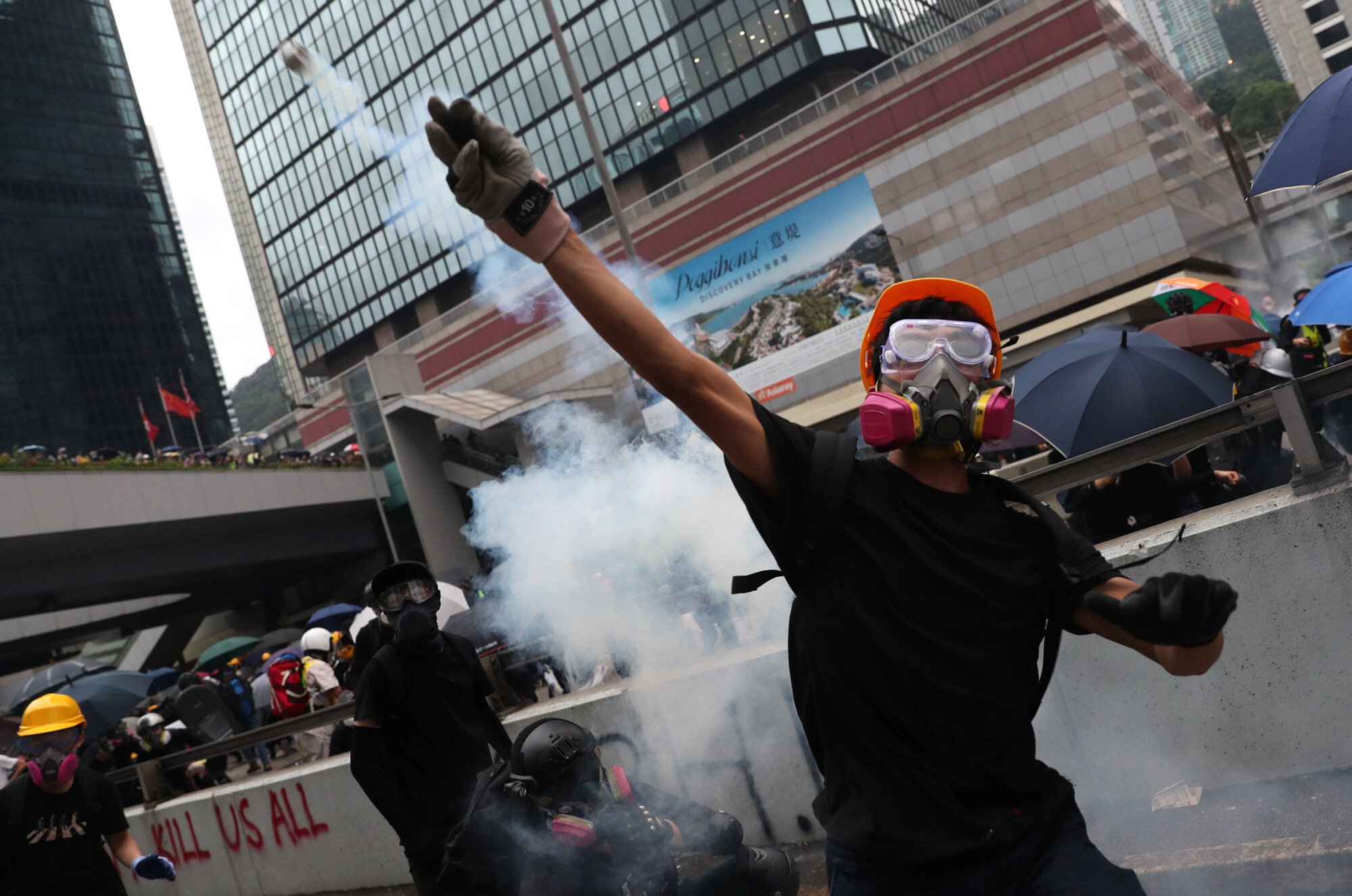
Hong Kong’s novice lawmakers: Anglican priest hopes to give jailed young protesters a second chance with studies, jobs
- Keep protesters’ criminal records with judiciary, not police, to help them get jobs, says Peter Koon
- Anglican cleric who helped Taiwan murder suspect Chan Tong-kai hopes case can be dealt with soon
The first religious lawmaker elected to Hong Kong’s legislature has vowed to bridge the social divide during his tenure by helping young people jailed for their actions in the 2019 anti-government protests to start anew.
But Reverend Canon Peter Koon Ho-ming, who recently resigned as provincial secretary general of the Hong Kong Anglican Church to focus on his legislative work, insisted the city’s freedoms remained intact despite recent crackdowns on the media and opposition activists.
Koon, 56, who was returned in the Election Committee constituency following Beijing’s “patriots-only” overhaul of the city’s political system, said he hoped to help young protesters with no record of violence get a second chance after their release from jail.
“The nature of the crimes they committed is very different. It’s about ideology and politics,” he told the Post in an interview. “Their chance of reoffending is also not high, given that the social atmosphere has already cooled down.”
Koon proposed to have the young protesters’ criminal records filed only with the judiciary, but not the police, which he said would make it easier for them to get a job.
He also said he hoped the Correctional Services Department could relax its rules on allowing inmates to continue studying, as the protests led to a significant number of university students and graduates being arrested and jailed.
“Currently it is difficult for inmates to advance their studies as they are only provided with taped lectures,” he said. “Can the authorities explore the possibility of offering them online courses or allow them to use the internet under certain restrictions?”
Koon spent more than a decade working for a mainland Chinese property developer in Shanghai before being ordained in 2005. Two years later, he became the Anglican church’s provincial secretary general, overseeing its development projects and social services.
He was most recently in the news for helping Chan Tong-kai, the young Hongkonger accused of murdering his girlfriend in Taiwan in 2018 whose thorny extradition situation was credited with prompting the bill that sparked the 2019 protests.

Asked his views on Hong Kong following Beijing’s imposition of the national security law in 2020, which resulted in mass arrests of opposition figures, the disbandment of civil rights groups and the shutting down of media outlets, Koon said the freedoms of speech and the press remained intact.
“What happened in 2019 was unacceptable in any country. The national laws in other places are similarly stringent. It’s just that Hong Kong was too loose [on the national security front] in the past,” he said.
“I genuinely think there is not much of a problem in Hong Kong as there is sufficient free speech. People can still criticise the government.”
Asked what he thought of a number of outspoken Christian leaders – including the former president of the city’s Baptist Convention, Reverend Lo Hing-choi, who left Hong Kong following the implementation of the security law – Koon said such a move was “one’s personal choice”.
The Hong Kong priest who left property work to seek justice
Koon is no stranger to politics. A staunch critic of the Occupy movement for democracy that paralysed parts of the city for 79 days in 2014, he is also a delegate to the Beijing Municipal Committee of the Chinese People’s Political Consultative Conference and an adviser to the Our Hong Kong Foundation, a think tank founded by former chief executive Tung Chee-hwa.
He once faced a barrage of criticism for suggesting that Hongkongers should “behave, because a cat would be granted more freedom by its master for good conduct”, in reference to the city’s relationship with Beijing.
Brushing aside criticism that he was “too close to power and the rich”, he told the Post: “There are bound to be people who will criticise you. I hope to prove myself by delivering something within my four-year term.”
Hong Kong murder suspect at centre of extradition bill crisis ‘has left safe house’
Koon is perhaps best known for helping murder suspect Chan, wanted for questioning in Taiwan over the death of his pregnant girlfriend, whose body was found stuffed in a suitcase in Taipei in 2018.
The case prompted the Hong Kong government to propose an ill-fated extradition bill that would not only have allowed Chan to be sent to Taiwan but also allowed for the rendition of suspects to the mainland.
Widespread opposition to the bill led to record-breaking protests calling for its withdrawal, which eventually morphed over the course of months into an often-violent movement for broader democratic reform.

Chan, now 23, was jailed locally for related money-laundering offences but has been stuck in limbo since his release from prison in October 2019.
Although he was prepared to go to Taiwan to face the murder investigation, the self-governed island and Hong Kong have not been able to agree on the procedures for his surrender.
Koon said he planned to lobby the government over a proposal to give Hong Kong courts extraterritorial jurisdiction to hear overseas murder cases involving local suspects or victims.
The proposal, made in 2019 as an alternative to the contentious extradition bill, was supported by Hong Kong’s professional legal bodies, the Bar Association and the Law Society, and some opposition politicians, but was eventually dismissed.
Koon said he preferred not to move a private member’s bill on the matter and would leave it to the Department of Justice to take the lead.
“It is a humanitarian issue,” Koon said, revealing that since his release, Chan had not stepped out of the safe house initially provided by police or his current place of residence. “After all, he just wants to be jailed.”
In Part 3 of this six-part series, the Post meets Hong Kong doctor and politician David Lam Tzit-yuen







